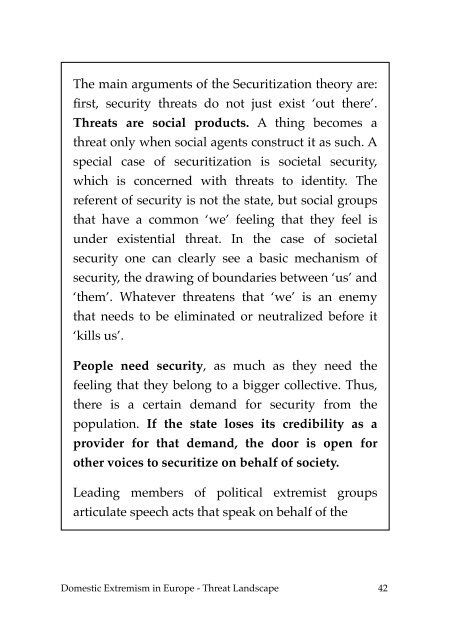Domestic Extremism in Europe - Athena Institute
Domestic Extremism in Europe - Athena Institute
Domestic Extremism in Europe - Athena Institute
You also want an ePaper? Increase the reach of your titles
YUMPU automatically turns print PDFs into web optimized ePapers that Google loves.
The ma<strong>in</strong> arguments of the Securitization theory are:<br />
first, security threats do not just exist ‘out there’.<br />
Threats are social products. A th<strong>in</strong>g becomes a<br />
threat only when social agents construct it as such. A<br />
special case of securitization is societal security,<br />
which is concerned with threats to identity. The<br />
referent of security is not the state, but social groups<br />
that have a common ‘we’ feel<strong>in</strong>g that they feel is<br />
under existential threat. In the case of societal<br />
security one can clearly see a basic mechanism of<br />
security, the draw<strong>in</strong>g of boundaries between ‘us’ and<br />
‘them’. Whatever threatens that ‘we’ is an enemy<br />
that needs to be elim<strong>in</strong>ated or neutralized before it<br />
‘kills us’.<br />
People need security, as much as they need the<br />
feel<strong>in</strong>g that they belong to a bigger collective. Thus,<br />
there is a certa<strong>in</strong> demand for security from the<br />
population. If the state loses its credibility as a<br />
provider for that demand, the door is open for<br />
other voices to securitize on behalf of society.<br />
Lead<strong>in</strong>g members of political extremist groups<br />
articulate speech acts that speak on behalf of the<br />
<strong>Domestic</strong> <strong>Extremism</strong> <strong>in</strong> <strong>Europe</strong> - Threat Landscape 42


